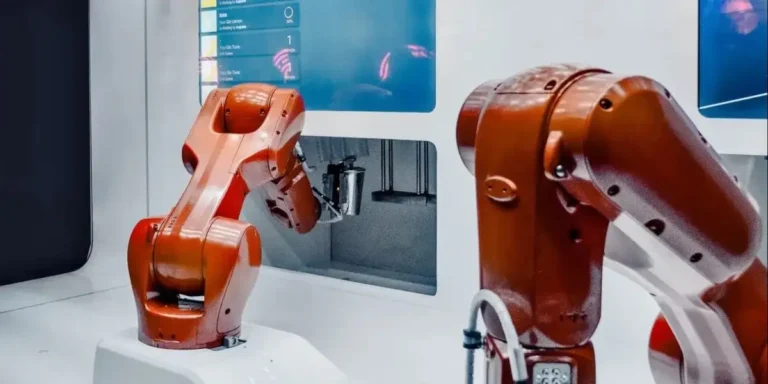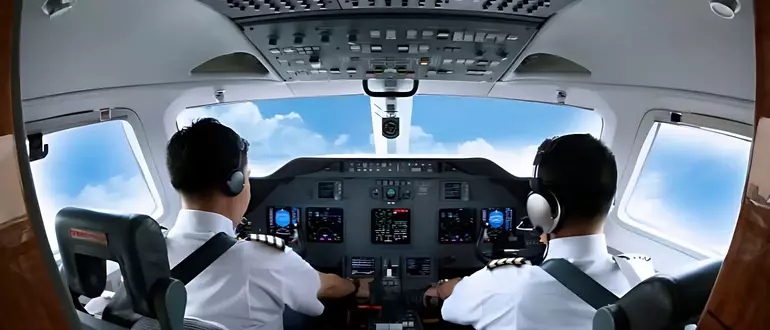
Aviation has led to technological advances in recent years.
The industry has adopted new technology, from computerized reservation systems to upgraded aircraft models.
Aviation is embracing AI. Many wonders if AI will replace pilots as it advances.
In this blog, we will explore the potential impact of AI on the aviation industry, get the answer that will replace pilots, the required skills pilots should gain, and the pros and cons of AI in this sector.
Will AI Replace Pilots?
No, AI is unlikely to replace pilots anytime soon due to the extensive legal, regulatory, and safety requirements that must be met.
It could take many years to create and test new laws to allow AI-controlled aircraft, making it unlikely that pilots will be replaced in the near future.
What Are The Potential Impacts Of AI Replacing Pilots Jobs?
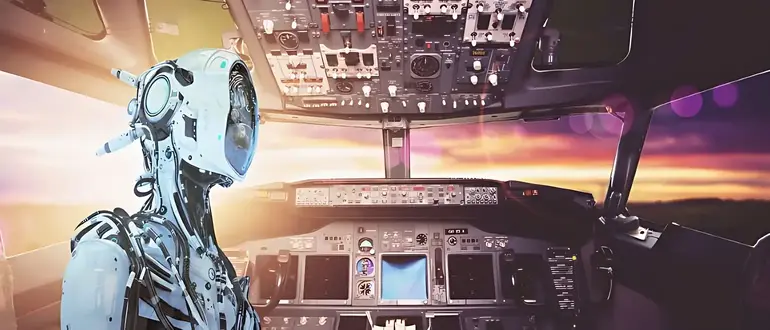
Improved Safety
Safety is the primary concern of any airline company, and AI has the potential to make aviation safer than ever before.
Using machine learning algorithms and sensors, AI can analyze data from multiple sources, including weather reports, air traffic control, and aircraft performance.
This data can help AI systems to detect potential problems and alert human operators, enabling them to take corrective action before an incident occurs.
Moreover, AI can help reduce human errors, which are a leading cause of aviation accidents.
AI-powered autopilots can control aircraft with greater precision and accuracy than human pilots.
It can also monitor and analyze cockpit data, such as oxygen levels and cabin pressure, to detect any anomalies that may affect the flight.
Reduced Costs
AI’s cost-cutting benefits for airlines are enormous. Hiring and training pilots are costly, and the aviation industry faces a pilot shortage.
AIrlines can save money by utilizing AI-powered technologies to replace human pilots.
AI can also lower airline expenses by optimizing aircraft routes, fuel usage, and maintenance schedules. It reduces delays and cancellations, which can hurt airline revenues.
Job Losses
AI could make aircraft safer and cheaper, but job losses are a concern. AI pilots might eliminate thousands of aviation jobs.
Pilots cannot easily transfer their abilities to other businesses, which could affect their livelihoods.
However, AI won’t replace human pilots soon. Instead, AI will help pilots make better decisions by giving them better tools and data.
Increased Safety: AI-powered planes may be safer, but AI systems are still unreliable.
AI-powered planes are only as good as their data and algorithms and can malfunction. Without a human pilot, some circumstances may not be handled as well.
Public Acceptance:
Uncertainty surrounds the public’s readiness to board aircraft completely driven by AI.
Worries about the security and dependability of AI systems may impact the demand for air travel.
Additionally, some passengers could find it unsettling since there isn’t any human interaction in the cockpit.
Cybersecurity Risks:
As with any technology that relies on computer systems, AI-powered planes could be vulnerable to cyber-attacks.
These attacks could range from simple hacking attempts to more sophisticated attacks aimed at causing physical damage or harm.
Ensuring the security of AI systems would be a critical consideration in the adoption of this technology.
Regulatory Challenges:
The adoption of AI-powered planes would require significant regulatory changes.
Aviation authorities around the world would need to create new rules and guidelines for the operation and maintenance of AI-powered planes.
This could be a slow and challenging process, potentially delaying the widespread adoption of AI in the aviation industry.
Ethical Concerns:
The use of AI in aviation raises ethical considerations that need to be addressed.
For example, if an AI-powered system detects a potential problem, should it alert the human operator or take corrective action itself?
Who is responsible if an incident occurs due to an AI system’s error? These complex questions must be addressed before AI can fully integrate into aviation.
What Skills Should Pilots Develop For The Future Of Aviation?
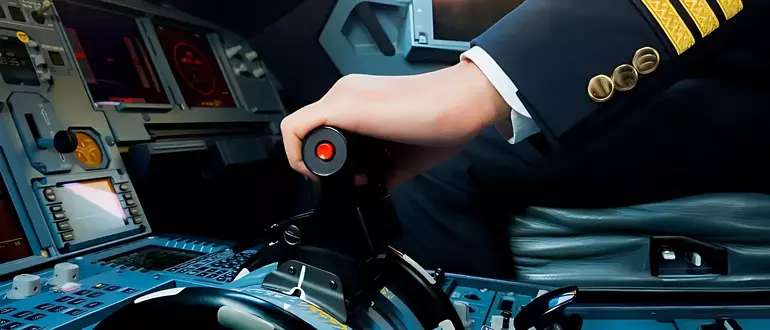
Digital Literacy:
Pilots must have a strong understanding of modern technology and be comfortable using it to its full potential.
As aviation technology advances, pilots must be able to navigate complex systems and software to ensure the safe operation of aircraft.
For example, the use of Electronic Flight Bags (EFBs) is becoming increasingly common in the industry, and pilots must be comfortable using them to manage flight plans and navigate airspace.
Critical Thinking:
Be become an expert Pilot; you must have excellent critical thinking skills, enabling them to make informed decisions quickly and under pressure.
A pilot must be able to assess an emergency, make informed decisions, and act to protect passengers and crew.
Critical thinking skills also help pilots to identify and mitigate risks, ensuring that flights run smoothly.
Communication Skills:
Flight operations require good communication.
Pilots must effectively communicate with air traffic control, ground crew, and other pilots about the flight plan, potential dangers, and flight path adjustments.
Strong communication skills also assist in avoiding miscommunication.
Adaptability:
Because the aviation industry is continuously changing, pilots must be able to do so fast in order to keep up with advancements in technology, rules, and practices.
Pilots who are able to pick up new information and adjust to new circumstances quickly will be better able to handle unforeseen difficulties that occur during flights.
Situational Awareness:
Pilots need to have high situational awareness so they can constantly be aware of the aircraft’s position, altitude, and speed.
This entails continuously tracking and analyzing data from the aircraft’s equipment as well as evaluating outside variables like the weather and other incoming air traffic.
Decision-Making:
As a Pilot, you must be able to make informed decisions quickly and under pressure.
This means figuring out the best way to keep passengers and workers safe by evaluating the situation, finding possible risks and hazards, and deciding what to do next.
Effective decision-making skills are essential for pilots, particularly during emergency situations.
Emotional Intelligence:
Pilots must control their emotions, especially under pressure. Emotional intelligence includes empathy, emotion recognition, and regulation.
Pilots who can control their emotions may handle unforeseen situations and stay calm during flights.
Cultural Awareness:
In today’s globalized world, pilots must have a strong understanding of different cultures and be able to work effectively with people from diverse backgrounds.
This involves being sensitive to cultural differences and adapting communication styles accordingly.
Culturally aware pilots are better equipped to build positive relationships with passengers and crew, enhancing the overall flight experience.
How Can Training Prepare Pilots For The Future Of Aviation?
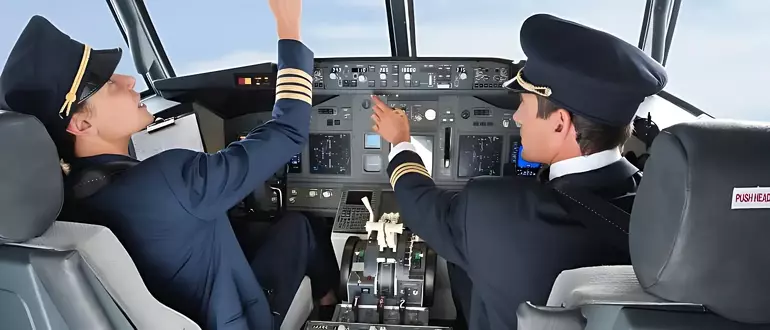
Automation and AI in Aviation
Automation and AI in aircraft are one of the biggest advancements in aviation. Pilots must learn how to use and understand this equipment.
More and more, pilot training programs are adding classes on automation and artificial intelligence (AI) to help pilots understand how to use and run these systems well.
Data Analytics and Decision-Making
Data analytics is another part of the airline business that is becoming more and more important.
Since sensors and other devices are making more data, pilots must now be able to look at this data and use it to make good choices.
Courses on data analytics are now part of training programs. This gives pilots the skills they need to understand and make sense of data.
Cybersecurity and Aviation
As more systems become connected and data is shared across networks, the need for cybersecurity in the aviation industry is becoming more critical.
Pilots must now be aware of potential cyber threats and know how to protect their aircraft and its systems from attacks.
Training programs now include cybersecurity courses to help pilots understand the potential risks and how to mitigate them.
Environmental Concerns and Aviation
The aviation industry is also increasingly focused on environmental concerns, such as reducing emissions and improving sustainability.
Pilots must now understand the impact of their operations on the environment and learn how to operate aircraft in a more environmentally-friendly manner.
Training programs are now incorporating courses on environmental sustainability, providing pilots with the knowledge they need to operate aircraft in a more sustainable way.
What Are The Pros Of AI In Aviation?

Improved Safety and Efficiency:
One of the most significant advantages of AI in aviation is enhanced safety and efficiency.
With AI technology, airlines can monitor and analyze data from various sources in real time, making it possible to identify and mitigate potential safety hazards.
AI can also help airlines optimize flight routes, reduce fuel consumption, and manage air traffic more efficiently, leading to cost savings and fewer delays.
For example, AI-powered systems such as Predictive Maintenance and Health.
Monitoring can help airlines detect mechanical issues before they become severe, reducing the risk of mechanical failures and increasing the safety of passengers.
Enhanced Customer Experience:
AI technology can help airlines improve the customer experience by providing personalized services, such as customized travel recommendations based on past preferences and enhancing in-flight entertainment options.
For instance, chatbots can assist passengers with inquiries, and AI-powered voice assistants can provide onboard entertainment and assistance, improving the overall customer experience.
Reduced Costs:
Another benefit of AI in aviation is cost reduction. Airlines can reduce staffing needs and lower operational expenses by automating routine tasks.
Additionally, AI can help airlines optimize their maintenance schedules, leading to reduced maintenance costs and increased aircraft uptime.
For example, AI-powered systems can analyze aircraft performance data and provide airline maintenance recommendations, reducing the need for routine maintenance checks and associated costs.
Improved Operational Efficiency:
AI technology can also help airlines streamline their operations by automating crew scheduling and fuel management tasks.
By reducing manual intervention, airlines can save time and resources and improve overall operational efficiency.
For instance, AI-powered systems can optimize flight schedules, considering factors such as weather conditions, fuel consumption, and crew availability, leading to more efficient operations.
Enhanced Decision-Making:
AI can help airlines make informed decisions by providing accurate and real-time data analysis.
AI can find patterns and trends in large volumes of data, helping airlines make smarter decisions.
For example, AI-powered systems can analyze data on passenger behavior, such as preferred travel times and destinations, to help airlines make more informed decisions regarding route planning and customer service.
What Are The Cons Of AI In Aviation?
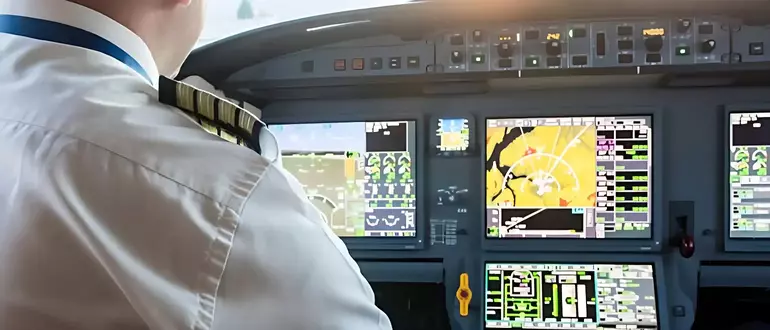
Safety Risks
One of the biggest concerns with AI in aviation is safety. If AI algorithms or data are wrong, the results could be disastrous.
For example, an AI system may misinterpret sensor readings and cause an aircraft to take the wrong course of action.
Similarly, AI systems could be vulnerable to cyberattacks, which could compromise the safety and security of an aircraft.
Job Displacement
The loss of jobs is another big worry about AI in flight. As AI gets better, it will be able to take over many jobs that humans do now, like flying planes, controlling air traffic, and doing maintenance.
This could save money and improve efficiency, but it could cost thousands of flight workers their jobs.
Lack of Human Judgment
AI systems are made to make choices based on data and algorithms, but they can’t use human intuition or judgment.
This could be a problem in aviation if an AI system runs into a situation it wasn’t designed to handle.
For example, a human pilot may be better able to make a choice based on their experience and gut feeling if an airplane is caught in bad weather or if a piece of equipment breaks down.
Data Privacy and Security Risks
AI systems need a lot of info to learn and decide what to do. In the airline industry, this information includes details about passengers, planes, and air traffic.
AI can be used to make security better and stop risks, but it also raises questions about the safety and privacy of data.
If this information gets into the wrong hands, it could be used to commit crimes or put passenger and flight safety at risk.
Ethical Concerns
As AI advances, ethical questions about machine decision-making arise. This could include decisions about emergency procedures, aircraft routing, and passenger safety in aviation.
There is also the concern that AI systems could be biased or discriminatory based on the data and algorithms used to train them.
FAQs
How Is AI Currently Used In Aviation?
AI is currently used in aviation for various tasks, such as predictive maintenance, flight planning, and weather forecasting.
It is also used in cockpit systems to assist pilots with navigation and autopilot functions.
Can AI Improve Aviation Safety?
Yes, AI can improve aviation safety by identifying potential safety risks and providing real-time information to pilots.
It can also assist with predictive maintenance, which can help prevent equipment failure and reduce the risk of accidents.
What Is The Role Of Human Pilots In The Age Of AI?
The role of human pilots in the age of AI is still crucial, as they are needed to make critical decisions and handle unforeseen situations.
While AI can assist pilots with certain tasks, it cannot replace the expertise and experience of human pilots.
Can AI Reduce The Need For Pilots?
AI can reduce the need for pilots in certain tasks, such as navigation and autopilot functions.
However, it cannot replace human pilots for decision-making and handling unforeseen situations, so the need for pilots will still be present.
What Is The Future Of AI In Aviation?
The future of AI in aviation is expected to involve further integration into cockpit systems and airline operations.
AI could boost aircraft design, maintenance, and passenger satisfaction.
However, the role of human pilots will still be important for ensuring safety and making critical decisions.
Conclusion
While the idea of AI replacing pilots may seem futuristic, it will not happen overnight.
Despite advancements in technology, numerous safety concerns and regulations still need to be addressed before AI can fully take over the cockpit.
However, AI can certainly assist pilots in their duties and make air travel safer and more efficient.
The human touch will always be important in aviation, and AI should be viewed as a tool to enhance rather than replace human skills.


